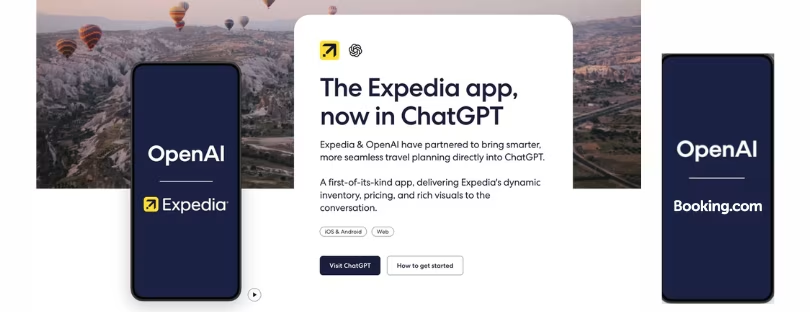
OpenAI Turns ChatGPT Into a Travel Booking Hub With Expedia, Booking.com and Tripadvisor
At its first developer conference this week, OpenAI confirmed what many in the travel and tech space anticipated: ChatGPT is no longer just a chatbot—it’s becoming a platform. The company unveiled apps within ChatGPT, powered by a new Apps SDK, and announced Expedia and Booking.com as two of the very first partners.
This opens up OpenAI’s 800 million–strong user base to third-party developers, effectively creating a new distribution channel for travel. Consumers will soon be able to plan, compare, and book travel directly inside ChatGPT conversations.
Alongside Expedia and Booking.com, the launch lineup includes Spotify, Figma, Zillow, Coursera, and Canva, with Tripadvisor, Uber, and TheFork also preparing to roll out apps.
Expedia and Booking.com Lead the Travel Pack
Expedia Group CEO Ariane Gorin wrote on LinkedIn that the partnership bridges the gap between conversation and booking:
“By bridging the gap between planning in ChatGPT conversations and booking on Expedia, we see enormous potential to create seamless traveler experiences.”
Expedia’s integration allows users to explore destinations, compare real-time hotel and flight options, and interact with maps—all without leaving ChatGPT.
Booking.com emphasized continuity with its existing OpenAI collaboration:
“With this feature, travelers have a new avenue to explore the vast selection of hotels, homes and unique places to stay on our platform.”
Both platforms essentially gain a new surface for discovery, embedding their inventory into conversations that feel natural and personalized.
TripAdvisor and the Next Wave
TripAdvisor’s upcoming app will fold in its signature reviews and AI-driven guidance. Rahul Todkar, head of data and AI at Tripadvisor, hinted at bigger ambitions:
“In the coming weeks, we’ll expand to full end-to-end travel planning, complete with activity discovery and booking.”
This signals a future where ChatGPT isn’t just about browsing—it becomes an agentic travel planner that can move a user from inspiration to transaction in one flow.
The Competitive Landscape
OpenAI’s move comes just days after Perplexity AI launched its own AI browser and assistant, Comet, with Expedia also signing on as a launch partner. Travel brands are increasingly hedging their bets, striking deals with multiple AI players in a bid to secure early distribution advantages.
TripAdvisor, for example, already has tie-ups with both OpenAI and Perplexity. Booking Holdings has done the same via its Operator collaboration with OpenAI earlier this year.
Industry Reactions: Caution and Excitement
The travel industry is buzzing—but also skeptical. Hospitality consultant Ira Vouk pointed out that adoption depends heavily on user awareness:
“This use case actually requires the user to type the app name in the chat window. This behavior is dependent on the companies’ advertising budgets. So, this is still NOT the use case that will flip the scale.”
Others, like DirectBooker CEO Sanjay Vakil, warned that the beneficiaries will be OTAs, not hotels:
“Aggregators are mostly the same OTAs that already dominate online distribution while taking 15–30% commissions. Hotels won’t be able to compete with OTAs on AI integrations.”
Meanwhile, Christian Watts of Magpie noted that while the feature is promising, execution still lags—Expedia’s app didn’t trigger reliably, and Booking.com’s search filters were limited.
The Bigger Picture
The introduction of ChatGPT apps marks a turning point: AI platforms are becoming distribution layers. Much like app stores or metasearch engines reshaped online travel, conversational AI could dictate how travelers discover and book trips in the near future.
The difference now is scale and immediacy. With hundreds of millions of ChatGPT users and an open-source protocol (MCP) powering integrations, the barrier to entry for third-party apps is lower than ever.
Yet, the early winners are familiar names. Just as with Google, metasearch, and mobile apps before it, OTAs have the budget, data, and clout to dominate first-mover advantage. Direct suppliers—hotels, airlines, tour operators—risk being sidelined again, unless they can innovate with their own AI-powered channels.
Looking at the global market, this follows the same pattern seen in China with Baidu’s ERNIE Bot partnerships and in South Korea with Naver’s Clova AI integrations. Aggregators and platforms thrive because they can scale inventory quickly across conversational ecosystems, while smaller players lag behind.








